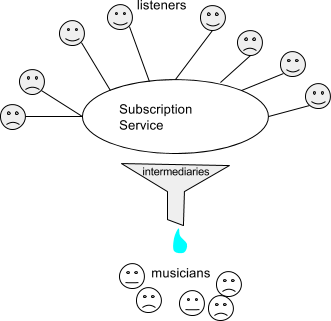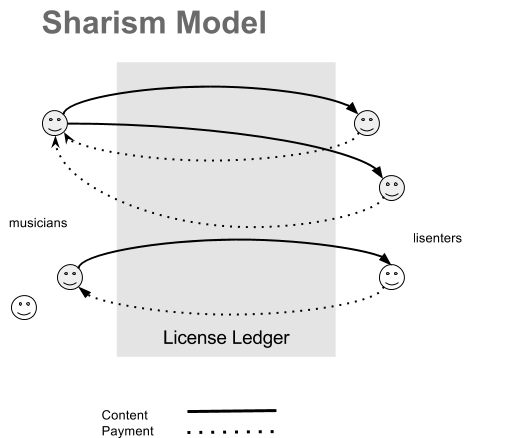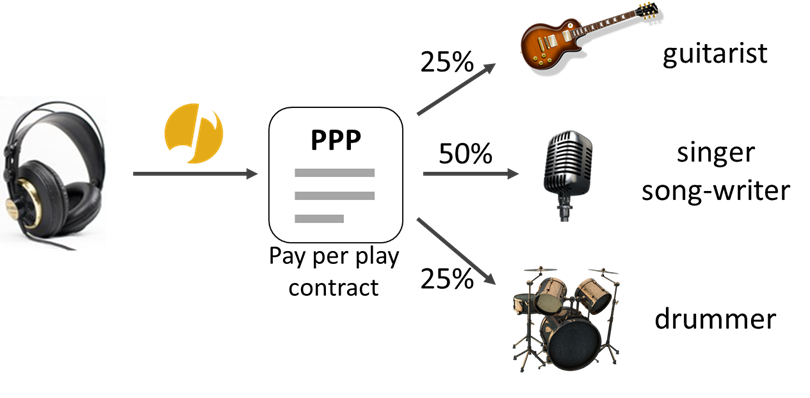Visualise this scenario for a moment.
As a music lover, you have access to all the tunes in the world on your devices: no subscription and platform lock-in, no libraries divided across multiple apps, no regional restrictions. All the music you want, and fully interoperable.
As a musician, you have the ability to copyright and self-publish your music on the basis of licence terms that give you (and your band members) direct and instantaneous payment for every play or download. No record label, no intermediaries. Added bonus: your music is open for anyone in the world to access and listen to.
This was the future that many thought the Internet would make reality, but didn’t quite. And it’s what digital activist Isaac Mao is trying to create, a reality he calls the ‘Musiconomy’. Best understood as an ecosystem, Musicoin, co-founded by Isaac in Hong Kong, aims to facilitate a paradigm shift in the way we publish and listen to music. To do to music what Wikipedia did for information. Just about three months after going live, Digital Asia Hub spoke to Isaac about the global music industry, and how Musicoin is using blockchain and cryptocurrency to change the way we publish and listen to music.
A music economy but not for musicians
The story of the global music industry, estimated to be worth US$ 15.6 billion in 2016, has always been grim reading for musicians. The advent of digital gave rise to P2P sharing services like LimeWire and Napster, the iTunes Music store, and then streaming platforms like Spotify and QQ Music. None truly benefited musicians financially. On streaming, Isaac explains: “The revenue from each streamed song has to be divided among intermediaries like record labels, performing rights organisations, and publishers. Then it’s subdivided until it trickles down to songwriters and performers”.
Figure A: P2P Torrent Model Figure B: Streaming Subscription model
[Images throughout: courtesy Musicoin, from the Musicoin White Paper]
Intermediaries like record labels, together with technology giants, capture close to 80% of the royalty payments due to artists. In several Asian countries, such as India, artists do not even receive this due to enforcement challenges with intellectual property. Furthermore, “to compound the complexity, there’s no foolproof way of identifying the relevant parties for a given song”, Isaac added, citing the 2016 settlement between Spotify and rights holders brokered by the US based National Music Publishers Association, arising from a dispute over unmatched and unpaid royalty payments. While Independent music labels, like Bandcamp, offered alternatives for musicians, they are still are limited when it comes to streaming.
As for listeners, with affordable access to large mainstream global music catalogs, it is fair to say they receive the better end of the stick. However, this comes at a price: they are forced to either be locked-in to one app and the music that it has on offer, or maintain libraries across multiple apps, a more tedious and expensive option. And the nature of streaming apps means that users have no file ownership, thus opting out means losing libraries and playlists. To say nothing of regional code restrictions that further restrict listening.
Consider this now widely cited Tweet from musician James Blunt: On average he receives just US$ 0.0005799392 per play, earning him US$ 578 for a million plays.
Enter the Musiconomy
Employing the blockchain (the underlying technology behind bitcoin, a cryptocurrency), Musicoin is redrawing the relationship between musicians, record labels and listeners to create a more equitable, sustainable and ultimately desirable outcome. Isaac calls it a “Musiconomy built on the foundation of sharism”.
As he describes it, Musicoin is not another platform or service seeking merely to disrupt the disruptors. There is no fee, it’s fully open source, and offers full transparency on all contracts and transactions. It can be compared to the Creative Commons license and Wikipedia, two paradigm shifting movements in the building up of the ‘Internet Commons’ that we take for granted today. Not coincidentally, these were the two movements that inspired Isaac to pen the essay “Sharism: a Mind Revolution”. “I saw sharism as the common path in our digital culture to create a stable digital hub…looking back at the formation of society, collaboration was key to development ”, Isaac emphasised.
To distill Musicoin in the simplest terms, musicians can upload their songs coupled with a copyright license in the form of a ‘smart contract’ built using blockchain. The contract tracks playback, and triggers payments directly from listeners to artists, instantaneously and without intermediaries, in the form of a digital currency called Musicoin.
The most basic contract for artists is the Pay Per Play (PPP) contract (see above) which facilitates revenue sharing right down to individual band members. In all cases the payments are instantaneous and direct allowing musicians to realise revenue immediately, versus waiting months for royalty cheques that either never arrive, or for many musicians, amount to only a few US dollars. “The contracts are made for the Internet, not constrained by national borders or labels, giving artists and listeners limitless access to music”, says Isaac. “It’s too early to claim a whole trend, but we are seeing an increasing number of musicians starting to realise they should control their works. They seek transparency, they want instant payments, they need a larger reward from the whole ecosystem. Musicoin allows them control over their own data, and freedom to change the metadata of their own works. It all sounds so natural but in truth this not possible even today in this long and twisted industry”.
He says Musicoin is not out to create rules: it wants to provide the freedom and tools for musicians and publishers to be creative. At present, Musicoin’s basic contract is PPP (see image above). But they are working on creating a lot more to satiate the demands of musicians and listeners. “We are going to deploy a new contract called ‘download contract’ that allows a song to be purchased and downloaded, but priced much higher. We are also designing contracts that allow users to listen to music offline, which will allow a user to listen to the song, say, 5 or 10 times. We are also exploring options like revenue from “likes” and “tips” in line with the modern social media generation”. (At a recent talk, he stated that tips were intended to compensate artists whose music you really loved, which also helps create community, and introduces emotion into the ecosystem. He also described musicians who had teamed up with other artists and formed bands, or guested on each other’s tunes, through the platform.)
Sharism is inclusive in nature and Musicoin has room for music labels too. In fact Isaac emphasises that for the Musiconomy to work, it must work with record labels. For example, independent music labels that have signed up to the platform have a different compensation ratio to that offered by the PPP contract.
Isaac explains their approach: “We are acquiring indie music first, which is where most of the existing songs on the platform are sourced from. We are targeting a young generation of musicians and listeners at this stage. This generation is very familiar with self-publishing, sharing, etc. They are not burdened by the traditional system. And they want instant effects. Soon, as they explore more interesting things around this, they will see how the value flows through the system. But we need musicians to see the value over time for more musicians to get on and build network effects.”
Herein lies one core challenge in creating the Musiconomy: generating network effects from musicians and listeners.
Musicians are clearly incentivised to share their music with no downside: they have full control to simultaneously peddle their albums elsewhere, anyway. But for the platform to work, for musicians to receive any benefit, they also need listeners to tune in. This feedback loop incentivises more musicians to share their music, which adds to the appeal, and as a result draws in more listeners, thus creating a similar ecosystem to the one that made Wikipedia the world’s encyclopedia of choice today.
$MUSIC
The digital currency that flows through the system is called Musicoin (traded as $MUSIC). It can be mined through a mining client yielding 314 coins per block. It is currently available on two cryptocurrency exchanges Cryptopia and Bittrex valued at US$ 0.01 (at the time of publication), where it can be converted into Bitcoin. “The value of Musicoin is what people perceive it to be, and changes all the time. We’re working on solving this problem. That’s why we created the blockchain with the deliberate design that it is linked to the music playing experience and the PPP license, where we believe the equilibrium is 1 coin = 1 stream. We believe that once people find value, it will stabilise and reach equilibrium which we expect will be more than 1 penny but it won’t get to $50 because no one would spend it to listen to music. Therefore our understanding is that eventually Musicoin will stabilise itself by market forces because of the PPP contract”. There is also no finite number of Musicoin that can be generated as there is no finite number of song plays.
At this point, musicians paid in Musicoin can only exchange the currency for fiat currencies (like USD or HKD) via bitcoin. The goal that Isaac envisions, and is reflected deliberately in its design, is for $Music itself to be an accepted means of exchange for other goods and services. In response to a question (raised by an audience member during a recent talk) about why they felt the need to create a new cryptocurrency rather than use an existing one, he explains that starting from scratch was in keeping with the goal of keeping costs low for entrants to the ecosystem.
The Muscoin project is clearly futuristic in design, and unsurprisingly that is where Isaac is looking to find solutions to make the movement truly viable. Take for for example the issue of file hosting and storage. “At this moment Musicoin runs its own server back ups. But this is temporary. We are seeking to use a distributed file system (DFS) so that the storage of music files can in theory be distributed and decentralised along the nodes of the network. We are also running a new algorithm, similar to proof of works in Ethereum, to reward people who host files. In time, we also hope to use machine learning to study listening habits and music tastes, which we hope can be of benefit to both listeners and musicians”.
Isaac is aware of the challenges that lie ahead, such as scaling the technology and the business model, as well as boosting security. “What we have today is just the beginning…it may take another 18 months to technically consolidate this idea”. This is in addition to convincing musicians and listeners to join and stay on the platform. “We need to consolidate our community, serve our musicians really well, create a good user experience and make it easy (for them) to use their money”, Isaac emphasises. Without these features, the movement would wither away, and the scenario described in the introduction would remain a fantasy, or perhaps be hijacked and then remixed another technology company.
At this stage, Musicoin is incentivising both musicians and listeners to join the movement. Listeners receive 100 free plays on joining (paid for by Musicoin) and 10 Musicoin (MC) for getting others to join. Artists are rewarded (in $MUSIC, naturally) for uploading their music. Musicoin is also opening up its API for third party developers to build off of and integrate other platforms with Musicoin, to make it more mainstream. Isaac is also exploring various revenue models or funding options that maintain the platforms integrity and vision while scaling sustainably.
In Asia, as much as anywhere else, copyright regimes can be challenging, and artists are rarely compensated, if at all. They are certainly less compensated than their western counterparts, and deal with different cultures and norms about paying for music. Musicoin’s goal is to channel the capabilities of blockchain towards transforming the music industry. Revenues from streaming grew by more than 20% in both India and China in 2016, revealing that users are increasingly willing to pay for music. It will be interesting to watch this space, and track emerging trends in how Asian consumers and producers of music engage with each other.
Isaac Mao is an entrepreneur, software architect, and social media researcher. He is a co-founder of Musicoin, a blockchain based music licensing/streaming platform (which can be joined here). He is also on the Steering Committee of Digital Asia Hub.
- Data Sovereignty in Action: Ant Group and Didi Chuxing Case Studies - September 12, 2022
- Pandemic strengthens China’s platforms as infrastructure providers - July 17, 2020
- The bio-surveillance state: an emerging new normal in Asia - May 8, 2020




